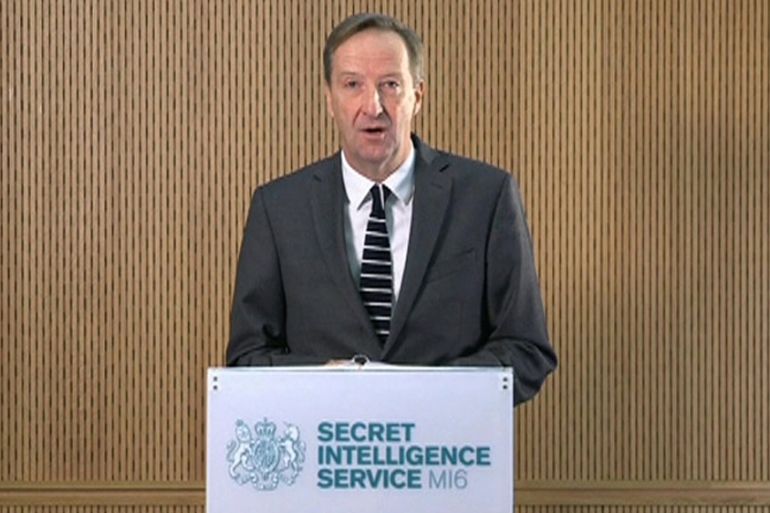MI6 chief warns Russia: Don’t underestimate the West
The head of British foreign intelligence set to deliver speech warning Russia should not underestimate UK capabilities.

The chief of British foreign intelligence agency MI6 is set to deliver a speech warning Russia not to underestimate the UK’s “capabilities” and “determination”.
Alex Younger’s speech comes after a brazen nerve agent attack on a retired double agent in England stoked fears about Russian covert activity abroad.
Keep reading
list of 4 itemsUS slaps fresh sanctions on Russia over Skripal affair
Second suspect in Skripal poisoning identified: Report
Why we know so much about Russia’s GRU operations
In only his second public address since becoming the head of MI6 four years ago, Alex Younger will warn Russia “or any other state intent on subverting our way of life not to underestimate our determination and our capabilities or those of our allies,” the Press Association said.
Younger will outline how, after the attack on Sergei Skripal, a former Russian military intelligence officer who betrayed dozens of agents to MI6, Britain’s allies in Europe and the United States ordered the biggest expulsion of Russian diplomats since the height of the Cold War.
The 55-year-old is also expected to describe how his agency played a central role in exposing the alleged perpetrators of the Salisbury nerve agent attack and the subsequent expulsion of Russian diplomats.
Britain identified the nerve agent deployed in the town of Salisbury as Novichok, a highly potent group of nerve agents developed by the Soviet military in the 1970s and 1980s.
Moscow has repeatedly denied involvement and accused British intelligence agencies of staging the attack to stoke anti-Russian hysteria.
Speaking at St Andrews University in Scotland, where he once studied, Younger will say that Britain’s spies have thwarted multiple Islamic State of Iraq and the Levant (ISIL, also known as ISIS) plots originating overseas and that it is “well equipped” to counter adversaries taking advantage of the “blurred lines” between the “cyber and physical worlds”.
Earlier this year, Jeremy Fleming, head of Britain’s Government Communications Headquarters (GCHQ) spy agency accused Russia of “not playing to the same rules” and blurring the boundaries between criminal and state activity.
As the UK is due to leave the European Union on March 29, Younger will also say MI6 continues to work with partner agencies to strengthen “indispensable security ties” in Europe.
![MI6 building in London [Matt Dunham/ AP Photo]](/wp-content/uploads/2018/12/876a38ecad014a86ba43364e30d0d2b0_18.jpeg)
Fourth-generation espionage
A career spy who joined MI6 as the Soviet Union was crumbling, Younger will stress the need for “fourth-generation espionage”.
“The era of the fourth industrial revolution calls for a fourth-generation espionage; fusing our traditional human skills with accelerated innovation, new partnerships and a mindset that mobilises diversity and empowers the young,” he will say.
His speech aims to encourage students to join the agency: “I want to speak to young people who have never seen themselves in MI6 … If you want to make a difference and you think you might have what it takes, then the chances are that you do have what it takes, and we hope you will step forward.”
An economics graduate and former soldier, Younger has worked for MI6 in Europe, the Middle East and Afghanistan since 1991, according to a short biography released by the government at the time of his appointment as MI6 chief.
|
|